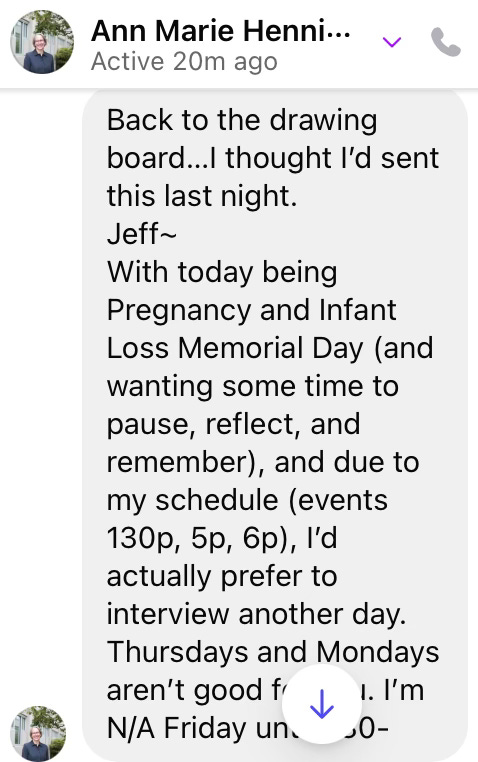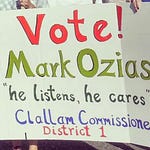When Olympic Medical Center Hospital Commissioner Ann Henninger agreed to an interview with Clallam County Watchdog, it was set to cover governance, transparency, and community trust. The interview was cancelled, but questions submitted by local residents deserve answers. Henninger is invited to respond here—or in her own words in the comments.
Olympic Medical Center is facing one of the most serious financial crises in its history — more than $70 million in reported losses since 2022, multiple leadership resignations, and growing public concern about transparency, staffing, and patient access.
As part of our ongoing series on OMC governance, CC Watchdog invited current Hospital Commissioner Ann Henninger, who is seeking re-election, to sit down for an in-depth interview addressing these issues.
Commissioner Henninger initially agreed to an interview and was gracious and communicative throughout our scheduling. However, due to unexpected work obligations and observance of Pregnancy and Infant Loss Memorial Day, she later asked to postpone. Given limited time before ballots arrive, CC Watchdog ultimately decided to move forward by publishing the questions publicly — unchanged and without commentary — so voters can see what would have been discussed.
These questions were developed with input from multiple community members, several of whom submitted thoughtful suggestions and concerns. They’ve been consolidated for clarity and flow. Commissioner Henninger is invited to respond to any or all of these questions, either in a response to this article (which would be published) or in the comments section below.
Conflicts of Interest and Ethical Concerns
Commissioner Henninger, many people may not realize that you work for the Jamestown Tribe — a corporation that competes directly with OMC in several areas. That’s raised concerns about whether there’s a conflict of interest in serving on both sides of that relationship. How do you separate those roles and reassure voters that your loyalty is to OMC’s patients and taxpayers?
Your husband also works at OMC. Do you see any potential conflicts when the board makes decisions that could affect staff or compensation?
There’s also public discussion about the tribe’s growing role in healthcare and whether OMC may shift unprofitable but essential services, like primary care or psychiatry, to Jamestown, where reimbursement rates are higher. Would you see that as a good partnership or a loss for OMC?
Financial Oversight and Accountability
Between 2022 and 2025, OMC lost more than $70 million. As board president, how closely were you monitoring those losses, and what actions did you take to reverse them?
The interim CFO recently said that even as revenues declined, OMC continued spending heavily on new equipment and contracts. Since those expenditures require board approval, why wasn’t spending curbed sooner? Can you recall any major purchase the board rejected during that time?
Critics have pointed out that former CEO Darryl Wolfe received satisfactory evaluations and raises despite these mounting losses. How do you explain that, and how is accountability handled now?
Do you believe the board has the right mix of experience? Some feel it’s too heavy on political backgrounds and too light on medical and financial expertise. Would you support expanding the board’s qualifications or structure?
Leadership, Staffing, and Culture
Following the resignations of the CEO, COO, and CFO, morale among hospital staff has reportedly dropped. How would you describe the current climate within OMC?
Would you support board members meeting privately with frontline employees — not through surveys, but in person — to ask simple questions like: How do you feel about your job? What could make it better? What’s not working?
OMC has also faced serious legal and regulatory issues, including a felony conviction of an ER employee, a class-action lawsuit over unpaid wages, and over 100 patient care citations this year. Do you see these as isolated incidents or evidence of a deeper cultural or management problem?
Community Trust and Access to Care
Public confidence in OMC is low. Many residents now seek care in other cities. What is your plan to rebuild trust and improve service quality close to home?
Wait times remain excessive — some patients report waiting months for scans or specialty appointments. What steps are being taken to improve access and efficiency?
The hospital also lost its eligibility for the federal 340B drug discount program, which has hurt both OMC and patients financially. How did that happen, and what’s being done to fix it?
Partnerships, Private Equity, and the Path Forward
There are persistent rumors that OMC may consider selling assets or aligning with private investors as part of a plan to attract the University of Washington. Can you clarify whether that’s under discussion, and what impact that could have on community control of the hospital?
The proposed UW partnership is said to involve as much as $70 million in potential support, but UW Medicine is itself facing serious financial challenges. Valley Medical Center in Renton recently ended its UW affiliation for that reason. Why should anyone believe this partnership would work here when it didn’t work closer to home?
Former CEO Wolfe suggested converting OMC into a “Critical Access Hospital,” which could bring higher reimbursements but would require cutting services and shrinking to 25 beds. Is that a viable solution?
Transparency, Taxes, and Public Confidence
OMC has often been criticized for a lack of transparency — unrecorded meetings, closed-door discussions, and limited financial disclosure. Would you support more openness and public access to board deliberations?
In 2024, the board championed a levy lift that doubled the hospital district tax for local homeowners. Despite that, OMC’s financial position continued to decline. How do you justify that to taxpayers?
Finally, after years of financial losses, leadership turnover, and public distrust — why should voters re-elect you? What will be different this time?
A Note to Readers
Commissioner Henninger is invited to provide a written response to these questions or to join the conversation publicly. Her full answers will be published without editing whenever received.
Special thanks to the community members who submitted questions and shared input for this piece. Your engagement makes accountability possible.












